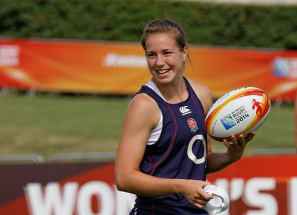At 35, Emily Scarratt has announced her retirement from playing rugby, concluding a 17-year international career that spanned women’s rugby’s transformation into a professional sport. The centre’s accomplishments include 119 England caps, 754 points as the nation’s record holder, and two World Cup victories. As the professional era’s most successful English player, her career charts the evolution of the women’s game itself.
Scarratt’s England debut came in 2008, during the sport’s semi-professional era. As women’s rugby evolved, so did Scarratt’s career, with her contributing to 11 Six Nations championships across different eras of the sport. Her achievement of competing in five World Cups allowed her to experience the game’s transformation firsthand—from amateur passion project to fully professional sport. This journey gave her unique perspective on rugby’s development.
The 2014 Rugby World Cup, still in the sport’s semi-professional days, saw Scarratt deliver a tournament performance for the ages. She finished as the leading scorer with 70 points and earned player of the final honors as England won the championship. By the time she received the 2019 World Rugby Player of the Year award, she had become one of the first truly professional English rugby players, helping pave the way for future generations.
Her versatility saw her captain Great Britain at the 2016 Rio Olympics and win a Commonwealth Games bronze medal with England sevens in 2018. At club level, she witnessed Loughborough Lightning’s evolution alongside the broader professionalization of the sport, having previously represented Lichfield in earlier eras.
Fittingly, Scarratt’s next chapter involves developing the next generation of professional players. She has accepted an assistant coaching position with Loughborough Lightning and will also work with the RFU in a specialist coaching and mentoring capacity. In her retirement statement, Scarratt expressed profound pride in being part of women’s rugby’s transformation into a professional sport and gratitude for the opportunity to retire on her own terms. England head coach John Mitchell described her as a once-in-a-generation player whose career paralleled and accelerated the sport’s professional evolution.

